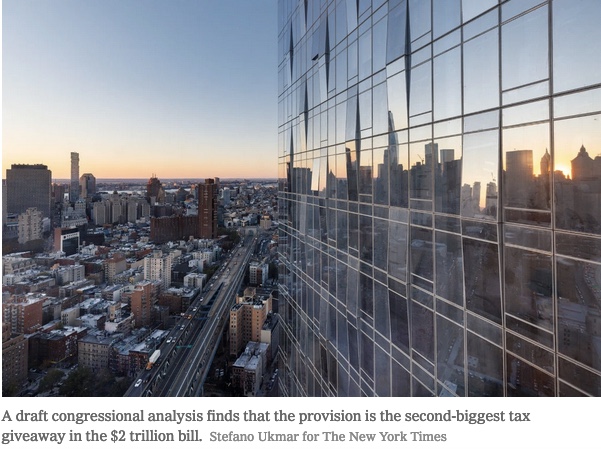The federal government’s planned $2 trillion economic rescue package includes financial aid for individuals and industries that are struggling to survive the coronavirus pandemic.
It also includes a potential bonanza for America’s richest real estate investors.
Senate Republicans inserted an easy-to-overlook provision on page 203 of the 880-page bill that would permit wealthy investors to use losses generated by real estate to minimize their taxes on profits from things like investments in the stock market. The estimated cost of the change over 10 years is $170 billion.
Under the existing tax code, when real estate investors generate losses from gradually writing down the value of their properties, a process known as depreciation, they can use some of those losses to offset other taxes. The result is that people can enjoy big tax breaks stemming from only-on-paper losses, even if they enjoy big cash profits in the real world.
But the use of those losses was limited by the 2017 tax-cut package. The losses could be used only to shelter the first $500,000 of a married couple’s nonbusiness income, such as capital gains from investments. Any leftover losses got rolled over to future years.
The new stimulus bill lifts that restriction for three years — this year, and two retroactive years — a boon for couples with more than $500,000 in annual capital gains or income from sources other than their business. That group comprises the top 1 percent of taxpayers, according to Internal Revenue Service data.
A draft congressional analysis this week found that the change is the second-biggest tax giveaway in the $2 trillion stimulus package. That cost analysis also includes the impact of some smaller technical changes to the law. Other industries, like oil and gas and commodities trading, also stand to benefit from the change.
“It’s a pretty big deal,” said Peter Buell, who runs tax services for the real estate practice of the accounting firm Marcum. A separate provision in the stimulus bill, which removes restrictions on losses that people can carry over from previous years, would make the tax break even more lucrative.




